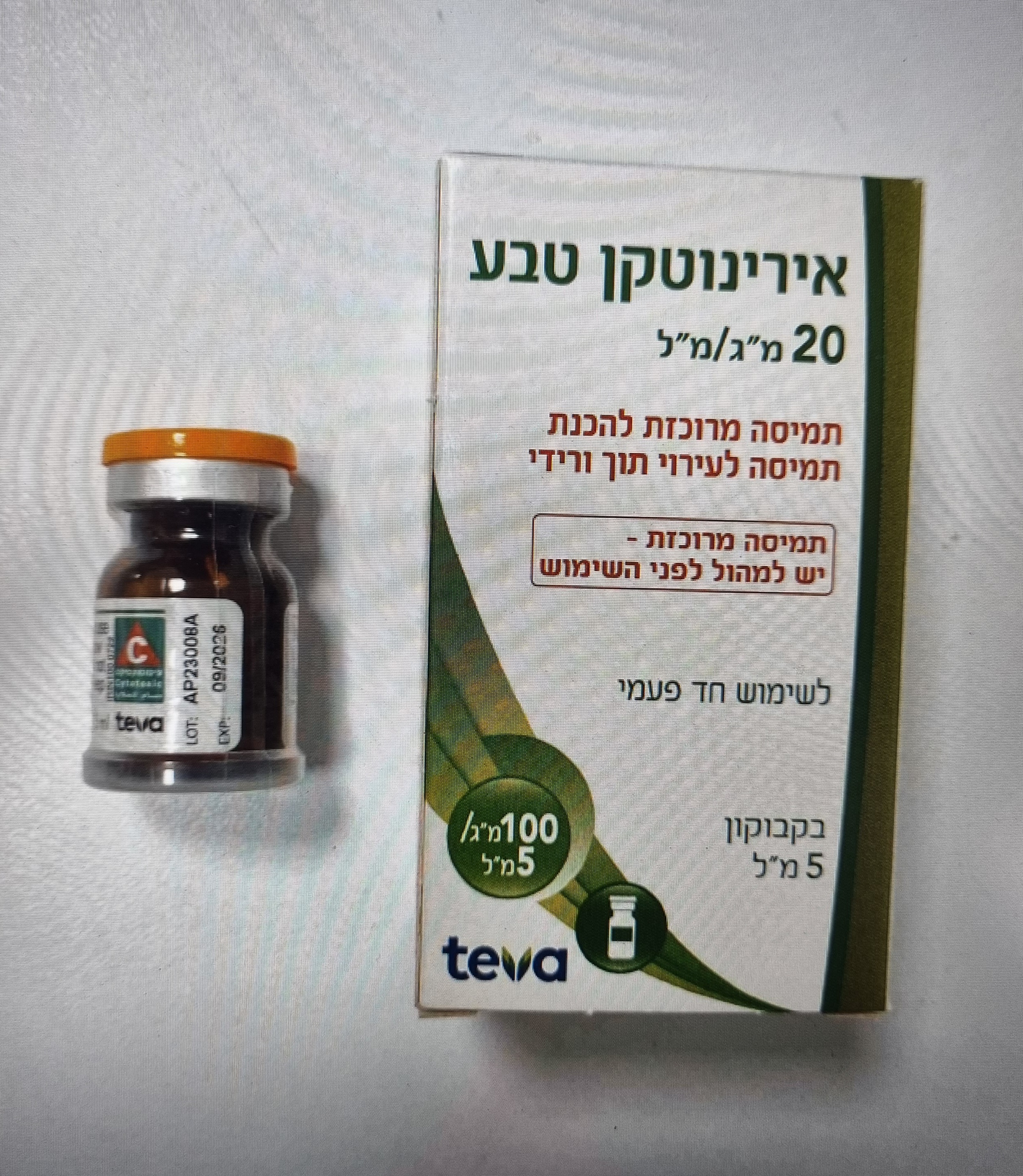Quest for the right Drug

אירינוטקן טבע IRINOTECAN TEVA (IRINOTECAN HYDROCHLORIDE TRIHYDRATE)
תרופה במרשם
תרופה בסל
נרקוטיקה
ציטוטוקסיקה
צורת מתן:
תוך-ורידי : I.V
צורת מינון:
תרכיז להכנת תמיסה לאינפוזיה : CONCENTRATE FOR SOLUTION FOR INFUSION
עלון לרופא
מינוניםPosology התוויות
Indications תופעות לוואי
Adverse reactions התוויות נגד
Contraindications אינטראקציות
Interactions מינון יתר
Overdose הריון/הנקה
Pregnancy & Lactation אוכלוסיות מיוחדות
Special populations תכונות פרמקולוגיות
Pharmacological properties מידע רוקחי
Pharmaceutical particulars אזהרת שימוש
Special Warning עלון לרופא
Physicians Leaflet
Interactions : אינטראקציות
4.5 Interaction with other medicinal products and other forms of interaction Concomitant use contraindicated (see section 4.3) Saint John’s Wort: Decrease in the active metabolite of irinotecan, SN-38, plasma levels. In a small pharmacokinetic study (n=5), in which irinotecan 350 mg/m2 was co-administered with St. John's Wort (Hypericum perforatum) 900 mg, a 42 % decrease in the active metabolite of irinotecan, SN-38, plasma concentrations was observed. As a result, St. John's Wort should not be administered with irinotecan. Live attenuated vaccines (e.g. yellow fever vaccine): Risk of generalised reaction to vaccines, possibly fatal. Concomitant use is contraindicated during treatment with irinotecan and for 6 months following discontinuation of chemotherapy. Killed or inactivated vaccines may be administered; however, the response to such vaccines may be diminished. Concomitant use not recommended (see section 4.4) Concurrent administration of irinotecan with a strong inhibitors or inducers of cytochrome P450 3A4 (CYP3A4) may alter the metabolism of irinotecan and should be avoided (see section 4.4): Strong CYP3A4 and/or UGT1A1 inducing medicinal products: (e.g. rifampicin, carbamazepine, phenobarbital, phenytoin or apalutamide): Risk of reduced exposure to irinotecan, SN-38 and SN-38 glucuronide and reduced pharmacodynamic effects. Several studies have shown that concomitant administration of CYP3A4-inducing anticonvulsant medicinal products leads to reduced exposure to irinotecan, SN-38 and SN-38 glucuronide and reduced pharmacodynamic effects. The effects of such anticonvulsant medicinal products were reflected by a decrease in AUC of SN-38 and SN- 38G by 50 % or more. In addition to induction of CYP3A4 enzymes, enhanced glucuronidation and enhanced biliary excretion may play a role in reducing exposure to irinotecan and its metabolites. Additionally with phenytoin: Risk of exacerbation of convulsions resulting from the decrease of phenytoin digestive absorption by cytotoxic medicinal products. Strong CYP3A4 inhibitors: (e.g. ketoconazole, itraconazole, voriconazole, posaconazole, protease inhibitors, clarithromycine, erythromycine, telithromycine): A study has shown that the co-administration of ketoconazole resulted in a decrease in the AUC of APC of 87 % and in an increase in the AUC of SN-38 of 109 % in comparison to irinotecan given alone. UGT1A1 inhibitors: (e.g. atazanavir, ketoconazole, regorafenib) Risk to increase systemic exposure to SN-38, the active metabolite of irinotecan. Physicians should take this into consideration if the combination is unavoidable. Other CYP3A4 inhibitors: (e.g. crizotinib, idelalisib) Risk of increase in irinotecan toxicity, due to a decrease in irinotecan metabolism by crizotinib or idelalisib. Caution for use Vitamin K antagonists: Increased risk of haemorrhage and thrombotic events in tumoral diseases. If vitamin K antagonist are indicated, an increased frequency in the monitoring of INR (International Normalised Ratio) is required. Concomitant use to take into consideration Immunodepressant agents: (e.g. ciclosporine, tacrolimus): Excessive immunosuppression with risk of lymphoproliferation. Neuromuscular blocking agents: Interaction between irinotecan and neuromuscular blocking agents cannot be ruled out. Since irinotecan has anticholinesterase activity, medicinal products with anticholinesterase activity may prolong the neuromuscular blocking effects of suxamethonium and the neuromuscular blockade of non-depolarising medicinal products may be antagonised. Other combinations 5-fluorouracil/folinic acid: Coadministration of 5-fluorouracil/folinic acid in the combination regimen does not change the pharmacokinetics of irinotecan. Bevacizumab: Results from a dedicated drug-drug interaction trial demonstrated no significant effect of bevacizumab on the pharmacokinetics of irinotecan and its active metabolite SN-38. However, this does not preclude any increase of toxicities due to their pharmacological properties. Cetuximab: There is no evidence that the safety profile of irinotecan is influenced by cetuximab or vice versa. Antineoplastic agents (including flucytosine as a prodrug for 5-fluorouracil): Adverse effects of irinotecan, such as myelosuppression, may be exacerbated by other antineoplastic agents having a similar adverse-effect profile.

פרטי מסגרת הכללה בסל
1. התרופה תינתן לטיפול במקרים האלה: א. סרטן מעי גס מתקדם (גם כטיפול ראשון). ב. סרטן החלחולת לטיפול בחזרה מקומית של המחלה. ג. סרטן לבלב גרורתי כקו טיפול ראשון.2. מתן התרופה האמורה ייעשה לפי מרשם של רופא מומחה באונקולוגיה.
מסגרת הכללה בסל
התוויות הכלולות במסגרת הסל
| התוויה | תאריך הכללה | תחום קליני | Class Effect | מצב מחלה |
|---|---|---|---|---|
| סרטן מעי גס מתקדם (גם כטיפול ראשון). | 16/12/1997 | |||
| סרטן לבלב גרורתי כקו טיפול ראשון. | 16/12/1997 | |||
| סרטן החלחולת לטיפול בחזרה מקומית של המחלה. | 16/12/1997 |
שימוש לפי פנקס קופ''ח כללית 1994
לא צוין
תאריך הכללה מקורי בסל
16/12/1997
הגבלות
תרופה מוגבלת לרישום ע'י רופא מומחה או הגבלה אחרת
מידע נוסף
